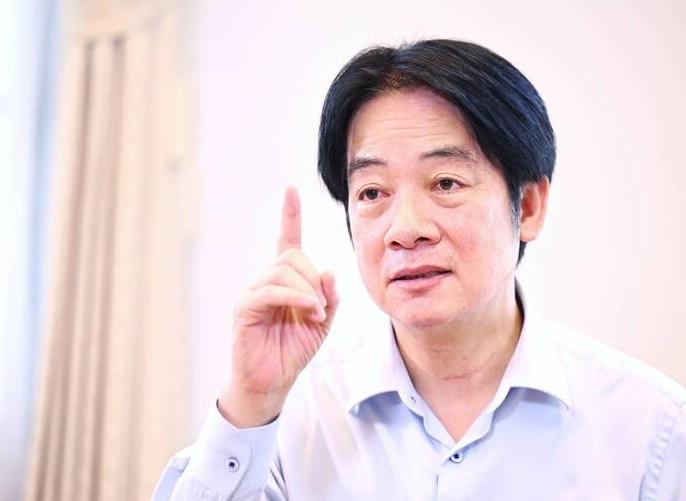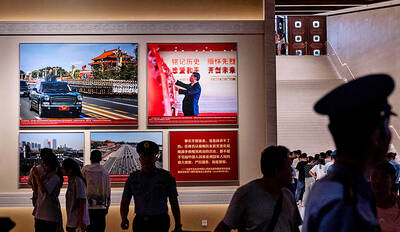The government would continue to push for higher wages, lower taxes and improved benefits to support women in the workplace and care for the youngest and eldest members of society, President William Lai (賴清德) said in an exclusive interview with the Liberty Times (sister paper of the Taipei Times) published today.
About half of the population does not pay income tax, while the top 1 percent of earners contribute almost half of Taiwan’s tax revenue, he said.
Lai vowed to continue promoting the tax-reduction initiatives started by former president Tsai Ing-wen (蔡英文), with a new policy next year to exempt young workers earning less than NT$620,000 (US$20,335) per year from income tax.

Photo: Fang Pin-chao, Taipei Times
Moreover, families of four with two children below the age of five and combined household income below NT$1.641 million would be tax-exempt, while families caring for two elderly members would be exempt for up to NT$2 million, he said.
The new measures would continue efforts to reduce wealth inequality, he added.
Lai also highlighted new regulations targeting foreign workers, saying he would continue to press the Ministry of Labor to ensure that businesses increase wages to a set minimum before being eligible to hire foreign workers.
Regulations would also be eased to allow families with one child up to age 12 to apply for a foreign domestic helper, allowing women to more easily enter the workforce and ease the burden on working mothers, he said.
Currently, the policy is limited to families with two children under six.
Tsai promoted a national childcare policy for children aged up to six and the Long-term Care Plan 2.0 — which created a community care system — to address Taiwan’s low birthrate and aging population, Lai said.
Lai said he is now promoting the second and third editions of those plans respectively to continue to care for Taiwan’s oldest and youngest citizens.

Three batches of banana sauce imported from the Philippines were intercepted at the border after they were found to contain the banned industrial dye Orange G, the Food and Drug Administration (FDA) said yesterday. From today through Sept. 2 next year, all seasoning sauces from the Philippines are to be subject to the FDA’s strictest border inspection, meaning 100 percent testing for illegal dyes before entry is allowed, it said in a statement. Orange G is an industrial coloring agent that is not permitted for food use in Taiwan or internationally, said Cheng Wei-chih (鄭維智), head of the FDA’s Northern Center for

The Chinese military has built landing bridge ships designed to expand its amphibious options for a potential assault on Taiwan, but their combat effectiveness is limited due to their high vulnerability, a defense expert said in an analysis published on Monday. Shen Ming-shih (沈明室), a research fellow at the Institute for National Defense and Security Research, said that the deployment of such vessels as part of the Chinese People’s Liberation Army (PLA) Navy’s East Sea Fleet signals a strong focus on Taiwan. However, the ships are highly vulnerable to precision strikes, which means they could be destroyed before they achieve their intended

About 4.2 million tourist arrivals were recorded in the first half of this year, a 10 percent increase from the same period last year, the Tourism Administration said yesterday. The growth continues to be consistent, with the fourth quarter of this year expected to be the peak in Taiwan, the agency said, adding that it plans to promote Taiwan overseas via partnerships and major events. From January to June, 9.14 million international departures were recorded from Taiwan, an 11 percent increase from the same period last year, with 3.3 million headed for Japan, 1.52 million for China and 832,962 to South Korea,

REWRITING HISTORY: China has been advocating a ‘correct’ interpretation of the victory over Japan that brings the CCP’s contributions to the forefront, an expert said An elderly Chinese war veteran’s shin still bears the mark of a bullet wound he sustained when fighting the Japanese as a teenager, a year before the end of World War II. Eighty years on, Li Jinshui’s scar remains as testimony to the bravery of Chinese troops in a conflict that killed millions of their people. However, the story behind China’s overthrow of the brutal Japanese occupation is deeply contested. Historians broadly agree that credit for victory lies primarily with the Chinese Nationalist Party (KMT)-led Republic of China (ROC) Army. Its leader, Chiang Kai-shek (蔣介石), fled to Taiwan in 1949 after losing a